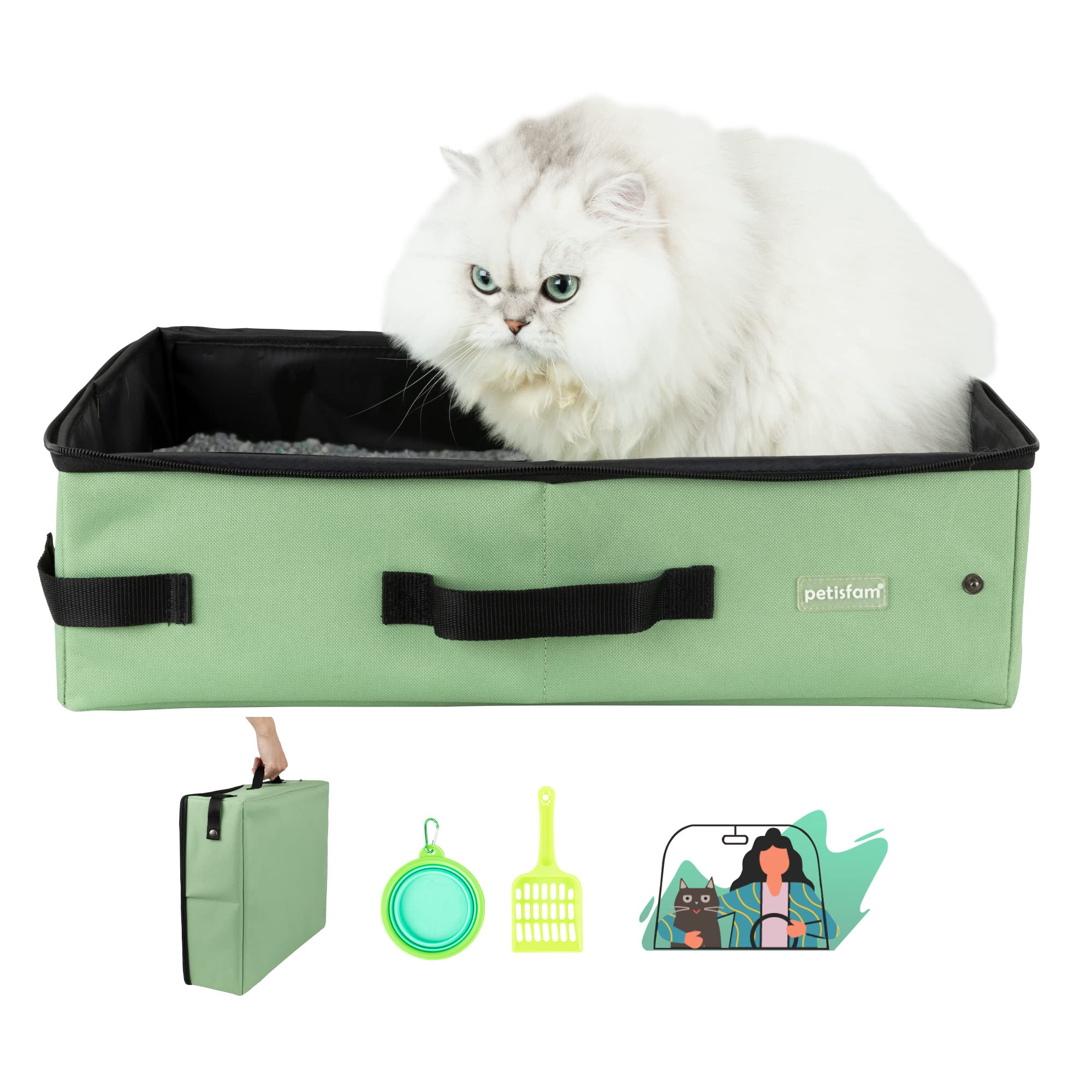Cat sedatives are commonly used for travel to calm cats during the journey. These sedatives help reduce anxiety and stress in cats by providing a calming effect.
They can be given in various forms such as pills, tablets, or liquid, and should be administered according to the veterinarian’s instructions. Additionally, it’s important to consider the timing of administration, as some sedatives may take time to kick in.
It is recommended to consult a veterinarian before giving any sedative to ensure the correct dosage and determine the best sedative option for your cat’s specific needs. Overall, cat sedatives can help make travel less stressful for both you and your furry friend.
Causes Of Cat Anxiety During Travel
Traveling can cause anxiety in cats due to the new environment and unfamiliar surroundings they encounter. Cats thrive on routine and familiarity, so sudden changes can lead to stress and discomfort. Additionally, the lack of control and confinement during travel can further contribute to their anxiety.
Being confined to a carrier or a moving vehicle can make cats feel trapped and out of control. Motion sickness and nausea can also make the travel experience distressing for cats. The combination of unfamiliar surroundings, lack of control, and potential discomfort can create a challenging situation for both cats and their owners during travel.
Fortunately, there are cat sedatives available that can help alleviate this anxiety and make the journey more comfortable for our feline friends.
Symptoms Of Cat Anxiety During Travel
During travel, cats may exhibit symptoms of anxiety such as excessive meowing, growling, or hissing. They may also become restless, pacing around. Another sign of anxiety could be inappropriate urination or defecation. To alleviate these symptoms, it is important to consider a cat sedative for travel.
Sedatives can help calm the cat’s nerves and make the journey less stressful for them. It is essential to consult with a veterinarian before administering any sedatives to ensure the right dosage and proper usage. By addressing cat anxiety during travel, pet owners can provide a more comfortable experience for their feline companions and make the journey more enjoyable for everyone involved.
Promotes A Stress-Free Travel Experience
Cat sedatives for travel provide a stress-free experience, reducing anxiety and calming the cat. By minimizing excessive vocalization and distressing behavior, these sedatives allow for better sleep and relaxation during the journey. Cats tend to feel uneasy during travel, but with the right sedative, their stress can be alleviated, making the trip more enjoyable for both the cat and the owner.
Sedatives specifically formulated for cats can help calm them down without causing any harmful side effects. The sedative works by calming the cat’s nervous system, promoting a state of relaxation and reducing anxiety. This helps the cat feel more at ease during the journey, preventing any distressing behaviors that may arise from travel-related stress.
With the use of a cat sedative, traveling with a feline companion can be a much smoother and more enjoyable experience.
Eases The Physical Discomfort Of Travel
Cat sedatives designed for travel can be incredibly useful in easing the physical discomfort that often accompanies journeys. These sedatives not only decrease symptoms of motion sickness and nausea but also help prevent digestive issues caused by stress. Additionally, they have the ability to relieve muscle tension and discomfort, allowing cats to travel more comfortably.
By using cat sedatives, pet owners can ensure that their furry friends have a more pleasant and stress-free travel experience. Whether it’s a short car ride or a long plane journey, these sedatives can help alleviate the discomfort that cats often face during travel.
With the physical effects of travel minimized, cats can better enjoy their adventures with their owners.
Over-The-Counter Sedatives For Cats
Over-the-counter sedatives for cats can provide relief during travel. Natural herbal supplements are a popular choice for calming anxious felines. These remedies, made from plant-based ingredients, can promote relaxation without any side effects. Homeopathic remedies are another option, using highly diluted substances to alleviate stress.
They are safe and gentle on your cat’s system. Additionally, pheromone sprays or diffusers can create a calming environment by releasing soothing scents that mimic a cat’s natural pheromones. These products can be effective in reducing nervousness and anxiety. When considering a sedative for your cat, it’s important to consult with your veterinarian to determine the best solution for your furry friend’s specific needs.
Traveling with a calm and relaxed cat can make the journey more enjoyable for both of you.
Prescription Sedatives For Cats
Prescription sedatives for cats include benzodiazepines, alpha-2 agonists, and antihistamines. These sedatives are given to cats during travel to help them stay calm and relaxed. Benzodiazepines are commonly prescribed and work by depressing the central nervous system. Alpha-2 agonists, on the other hand, work by reducing the release of norepinephrine, a neurotransmitter that regulates the body’s response to stress.
Antihistamines, although primarily used to treat allergies, can also have a sedating effect on cats. It is important to consult with a veterinarian before administering any sedatives to ensure the proper dosage and to address any potential risks or side effects.
Cat’S Age And Health Condition
Cat’s age and health condition play a crucial role in determining the appropriate sedative for travel. For senior or geriatric cats, it’s essential to consider their specific needs and potential risks associated with sedation. These cats may have underlying health issues, such as arthritis or heart disease, which could impact their response to sedatives.
Consulting with a veterinarian is vital to ensure the cat’s safety and well-being during travel. Additionally, cats with chronic health conditions may require specialized sedatives tailored to their unique medical history. Taking into account the cat’s age, overall health, and any preexisting medical conditions will ensure a successful and safe travel experience for both the cat and its owner.
Duration Of Travel
Planning a trip with your feline friend and wondering about the duration of travel? Whether it’s a short trip or a long-distance journey, the concern remains the same. Short trips, often within a few hours, may not require a sedative for your cat.
However, for longer journeys, a cat sedative can provide a calming effect and reduce anxiety. It is essential to consult with your veterinarian to determine the appropriate sedative dosage and duration for your cat. Additionally, multiple journeys within a short period may require a different approach to ensure your cat’s well-being.
Remember, the goal is to keep your furry companion relaxed and comfortable during travel.
Individual Cat’S Response To Sedatives
Every cat’s response to sedatives can vary, especially when it comes to sensitivity to certain medications. Some cats may have had previous sedation experiences, which can also influence their reaction. It is essential to consider each cat’s individual needs and consult with a veterinarian before administering any sedatives for travel.
This ensures that the medication chosen is suitable for the specific cat and minimizes any potential risks. By understanding the cat’s previous sedation experiences and being aware of their sensitivity to certain medications, pet owners can make informed decisions about the most appropriate sedative for their feline companion.
Remember to prioritize safety and consult with professionals for the best outcome during travel with a sedated cat.

Credit: meowa.com
Consultation With A Veterinarian
A consultation with a veterinarian is essential when considering a cat sedative for travel. With their professional advice and guidance, they can recommend the correct dosage for your furry friend. Vets have the knowledge and expertise to ensure the safety and comfort of your cat during the journey.
They will take into account factors such as the cat’s age, weight, and overall health to determine the appropriate sedative. It is crucial to follow their recommendations precisely to avoid any complications or adverse reactions. Remember, only a veterinarian can accurately prescribe a sedative that is suitable for cats and meets their specific needs.
By seeking their guidance, you can ensure a smoother and stress-free travel experience for both you and your feline companion.
Proper Timing Of Sedative Administration
Proper timing of sedative administration is crucial when it comes to preparing your cat for travel. By following the recommended guidelines, you can ensure a smooth journey for your feline companion. Pre-travel sedation timings should be carefully planned to minimize any discomfort or anxiety.
It is important to consult with your veterinarian to determine the appropriate dosage adjustments based on the duration of travel. Whether it is a short trip or a long journey, the sedative should be administered at the right time to ensure its effectiveness.
By understanding the unique needs of your cat and adhering to the recommended guidelines, you can create a stress-free travel experience for your furry friend. Remember, safety and the well-being of your pet should always be your top priority.
Monitoring The Cat During Travel
During travels, it’s crucial to monitor your cat closely. Observe your furry friend for any adverse reactions that may occur. This is essential to ensure their safety and overall well-being. By keeping a watchful eye on your cat, you can address any discomfort or anxiety they may experience.
It’s important to remember that each cat is unique, and their reactions to travel may vary. Stay attentive to any signs of distress, such as excessive meowing or restlessness. Additionally, provide a comfortable and familiar environment for your cat in their carrier.
Taking these precautions will help make the journey smoother and more enjoyable for both you and your feline companion.
Conclusion
A cat sedative can be a helpful solution to reduce the stress and anxiety that many cats experience during travel. By administering a sedative, you can ensure a calmer and more comfortable journey for both you and your feline friend.
Remember, it’s important to consult with your veterinarian to determine the right sedative and dosage for your cat, as individual needs may vary. Additionally, it’s crucial to follow the instructions and guidelines provided by the veterinarian, ensuring the safety and well-being of your cat.
Don’t forget to consider alternative methods such as natural remedies, pheromone sprays, or calming treatments if you prefer a non-medical approach. Ultimately, the goal is to make travel as smooth and stress-free as possible, allowing your cat to feel relaxed and at ease during the journey.
Happy travels!








